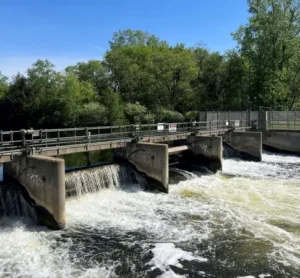The November edition of News to Us features updates on state and local environmental news, including a package of state level clean energy bills, repairs to Flook Dam, and efforts to remove dams across Michigan. Learn more below about the impact of PFAS contamination on local agriculture and new technology deployed to monitor Lake Erie water quality.
Michigan House passes climate change reform, mandating clean energy by 2040
In early November, the Michigan House of Representatives approved a trio of bills called the Clean Energy Future package. These bills put Michigan on a path towards clean energy by reforming permitting for large wind and solar arrays and requiring energy utilities to get 100 percent of their energy from clean sources by 2040. The bills were then approved by the Michigan Senate and are now awaiting Governor Gretchen Whitmer’s signature. For HRWC’s take on the Clean Energy Future package, read a recent blog by our Government Relations Director David Lossing.

Michigan steps up dam removal in race against climate change
New state and federal dollars are supporting dam repair and removal across Michigan. Currently, the state is home to over 2,500 dams that fragment more than 72,000 miles of rivers, impair fish migration, and artificially warm waters. While many dams still provide recreational and economic benefits, others pose potential hazards and are costly to maintain due to their old age. Dam removal is now a viable option for many of Michigan’s dams with over $15.3 million available in state funding. Learn more about the dam removal process in a blog by HRWC’s Daniel Brown.
PFAS contamination bringing end to family farm in Brighton
This piece from WEMU’s Issues of the Environment interviews Jason Grostic, owner of a century-old cattle farm in the Brighton area. In 2022, Grostic was forced by the state of Michigan to stop selling beef due to PFAS contamination. The PFAS was linked back to Tribar Manufacturing in Wixom. As a result, Grostic has sold off all his equipment and is close to bankruptcy. ⏯ The story was also captured in a microdocumentary from VICE News spotlighting Grostic Cattle Company and other farms across the US impacted by PFAS contamination. ⏯The Grostic family farm story is an important example of why Michigan farmers need stronger polluter pay laws, learn more in a blog by HRWC’s Daniel Brown.
Building a smart Lake Erie watershed
A network of buoys using low-power radio signal technology are monitoring water quality across 6,500 square miles of Lake Erie. This initiative, called the Smart Lake Erie Watershed, is a collaboration between the Cleveland Water Alliance (CWA) and Limnotech to track real-time water data and inform water resources decision making. The buoys currently track wave height, algal blooms, and water clarity to help charter boat captains, scientists, and anglers better understand changing conditions on Lake Erie. HRWC has also been collaborating with CWA and local partners to standardize volunteer monitoring within Lake Erie tributaries through the Lake Erie Volunteer Science Network. Learn more here!
Officials plan repairs after failure of Huron River dam built in the 1960s
Flook Dam, located just downstream of Portage and Baseline lakes, is in need of repairs following a mechanical failure in June. In late October, the Washtenaw County Water Resources Commissioner’s (WCWRC) Office held an informational meeting to discuss to the status of the dam and plans for repair. WCWRC staff underscored that the mechanical issue poses no imminent safety threat to residents and property owners. For more information and a recording of the meeting, click here.



